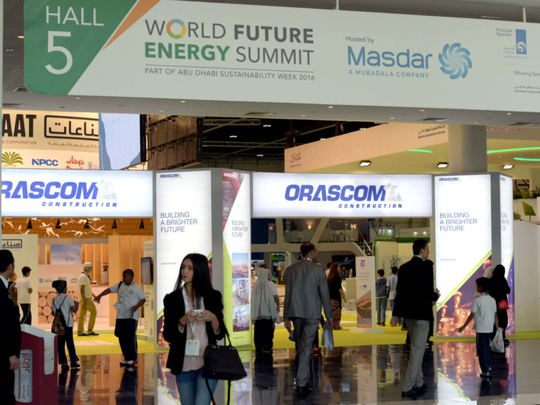
Last week, when the world came together for Abu Dhabi Sustainability Week (ADSW), it did so at a time of considerable geopolitical and economic uncertainty. But it was also a moment of unprecedented unity, following the global adoption of the Sustainable Development Goals and the Paris Agreement on Climate Change.
ADSW presented the first opportunity for both policy-makers and business leaders to sustain the forward momentum achieved in 2015, and to transform political consensus into decisive, tangible actions. Today, with political will and market forces so closely aligned, the scale of the economic opportunity before us is undeniable. Global investment in clean energy reached an estimated $329 billion (Dh1.21 billion) last year, an all-time high. And according to the International Renewable Energy Agency, doubling the share of renewables in the energy mix by 2030 could inject more than $1 trillion into the global economy.
Having said that, the world’s growing demand for energy cannot be met by one source alone. Doing so will require all energy sources, both traditional and new, to work hand-in-hand. Given our historic expertise as a global energy supplier, the UAE is right to spearhead the transition towards a new energy and economic future. Broadening our energy mix will strengthen, not undermine, our historic energy leadership. Here, in the Arabian Gulf, while we will remain a reliable supplier of oil and gas to the world for many years to come, delivering on our renewable energy targets will spur job creation and continued economic diversification.
Sustainable development is, I believe, the key to economic prosperity, social equality and climate change mitigation. It increasingly breathes new life into the global economy and, at the same time, addresses the environmental and climate challenges we all face. But this can only be achieved if governments and businesses commit to being bold and ambitious, together.
The UAE must continue to lead by example. The repeated calls to action by President His Highness Shaikh Khalifa Bin Zayed Al Nahyan, His Highness Shaikh Mohammad Bin Rashid Al Maktoum, Vice-President and Prime Minister of the UAE and Ruler of Dubai, and His Highness Shaikh Mohammad Bin Zayed Al Nahyan, Crown Prince of Abu Dhabi and Deputy Supreme Commander of the UAE Armed Forces, underscore the importance our leadership places on sustainable economic diversification.
Consider the far-sighted statement by Shaikh Mohammad Bin Zayed — that the day when the UAE exports its last barrel of oil will be a cause for celebration not commiseration. This was a clear recognition of the importance of economic diversification and a pledge to ensure our country’s sustainable, prosperous growth.
Economic diversification and progress towards a sustainable and prosperous future will be the focus of the forthcoming ministerial retreat announced by Shaikh Mohammad Bin Rashid.
Central to those discussions will be the role that new and existing industries can play in enabling the UAE to meet its sustainable development goals. Much has been achieved already. In terms of diversification, some two thirds of the UAE’s gross domestic product is derived from non-oil or gas sources. The UAE is now recognised as a leader in a variety of sectors besides energy; notably financial services, real estate, logistics, aviation, industry, professional services and tourism.
The common link between all of these industries, of course, is innovation and research and development. This is the reality of a global marketplace that is increasingly technology-driven and digitally aware.
Realising our economic potential requires the open-mindedness to diversify but equally, the clarity of focus to nurture the human capital needed to compete on the world stage. Commitment to innovation and human capital development will remain a cornerstone of the UAE economy. Embracing new industries and strengthening existing ones will open the door to economic opportunity, strengthen collaboration with like-minded nations and enshrine knowledge as our most precious commodity.
In the months ahead, the UAE will continue to build on the achievements of ADSW, enabling policy-makers and business leaders to forge a pathway towards a more sustainable future.
Dr Sultan Ahmed Al Jaber is UAE Minister of State and Chairman of Masdar.









